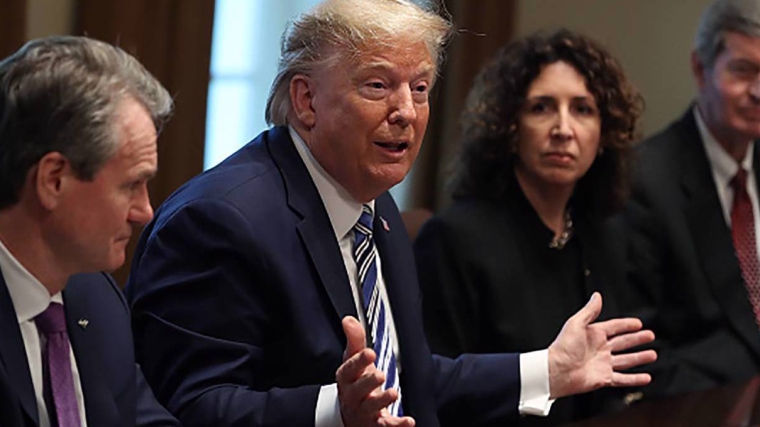
On Monday, February 24, with stock markets close to all-time highs, the world was suddenly thrown into a financial crisis as a result of the COVID-19 pandemic. And ever since, international leaders have been making the worst of a bad situation. On March 6, Russia and Saudi Arabia started an oil-price war, which shook global markets further. And US President Donald Trump’s televised address on March 11, in which he announced a suspension of most travel from Europe to the United States, brought the crisis to an entirely new height and plunged financial markets into unmitigated panic.
The combination of a coronavirus-induced growth slowdown and worldwide financial panic means that a global recession this year is virtually certain. But recession might soon be the least of our worries.
Financial crashes follow a clear logic in both their evolution and resolution, as Charles Kindleberger taught us in his seminal book Manias, Panics, and Crashes: A History of Financial Crises. Argentina and Lebanon have already defaulted on their foreign debts since the COVID-19 outbreak. Major corporate bankruptcies will likely come next. Travel companies and airlines are natural candidates, but failures often come in surprising areas.
After a few big bankruptcies and sovereign defaults, the world is likely to face a liquidity freeze, as it did in September 2008, following Lehman Brothers’ bankruptcy. A liquidity freeze typically hits periphery countries that have their own currencies, which will collapse – prompting a flight to the dollar and the euro.
Although it is very difficult to restore confidence once financial panic has erupted, the resolution of the 2008 crisis offers important lessons for policymakers today. True, that crisis originated in the financial sector, which now appears to be much better capitalized, and policymakers back then had no pandemic to contend with. Nonetheless, the fundamental lessons remain the same.
The world is changing fast and we now need your support more than ever. Quality journalism is expensive and in these very troubled times our ad revenues are becoming very uncertain. We provide our coverage free to readers, and if you value that, we ask that you Become a Supporter. To do that, either click on the Red button below, or on the Black button at the top of this page. The level of your support is up to you. Thank you. (If you are already a Supporter, you're a hero.)
Stemming a global financial panic requires two things: international political cooperation and vast amounts of government liquidity (because the private sector will hoard cash). Although the resolution of the 2008 crisis looked like a mess at the time, in hindsight it appears almost ideal.
Back in 2008, US political leaders had the stature to help rally the world. In mid-November that year, President George W. Bush convened the G20 Washington Summit on Financial Markets and the World Economy, which marked the start of a coordinated global effort to resolve the crisis. Crucially, the unanimously adopted summit declaration stated that, “We are determined to enhance our cooperation and work together to restore global growth and achieve needed reforms in the world's financial systems.” Apart from promising various forms of financial support, G20 leaders committed themselves to maintaining an open global economy.
In parallel, the US Department of the Treasury and the Federal Reserve swiftly bailed out one major financial institution after another. Although policymakers’ ad hoc approach and lack of clear guiding principles generated much public criticism, these institutions were stabilized very quickly. In addition, congressional Republicans and Democrats agreed on a large fiscal-stimulus package. Even so, the financial-market havoc continued until markets finally hit bottom on March 9, 2009, a half-year after the Lehman collapse.
Unfortunately, however, the world currently seems ill-equipped to repeat the successful policy response of 2008. For starters, the political preconditions are absent – not least because the US administration has no economic policymaker with significant domestic or international stature. Trump himself lacks credibility, and he has severely undermined market confidence in Fed Chairman Jerome Powell. Treasury Secretary Steven Mnuchin, meanwhile, keeps a very low profile.
The dearth of international clout extends beyond the US. The leaders of the European Union, the European Central Bank, and the International Monetary Fund are all new in their jobs. German Chancellor Angela Merkel is a politically weakened lame-duck leader, French President Emmanuel Macron’s international standing has slipped, and the United Kingdom’s prime minister, Boris Johnson, is preoccupied with Brexit.
But it is the absence of US leadership that is the most striking difference between now and 2008. Trump’s nationalism, protectionism, and refusal to heed expert advice make it difficult to imagine any credible international summitry and cooperation as long as he is in office. That means the world will have to wait until January 2021 at the earliest for any coordinated attempt to resolve the current crisis.
Financially, too, the world might be less well-equipped to handle a crisis than it was in 2008. Although the global financial sector seems to be in much better shape than it was 12 years ago, global indebtedness (relative to GDP) has never been higher. In particular, US public debt is at its highest level (as a share of GDP) since World War II. And although most EU member states fortunately have ample fiscal space, they need to use it with great skill.
Needless to say, the COVID-19 pandemic is the greatest challenge facing the global economy since 2008. And, so far, world leaders have shown that, this time, they are not up to the task of meeting it. Unless that changes very quickly, there is every reason to expect a long and severe global recession, with profound implications for developed and developing countries alike.
Anders Åslund is a senior fellow at the Atlantic Council in Washington. His latest book is Russia’s Crony Capitalism: The Path from Market Economy to Kleptocracy. Copyright 2020 Project Syndicate, here with permission.
11 Comments
Aye the sky is black, the sea is up and the wind rising before a rocky shore. Round about now passengers & crew usually start really thinking about who exactly is on the bridge.
Why must everything be Trump's fault? The response has been exactly what the experts recommended.
This is the sort of leftist nonsense I'd expect to read on stuff. Shame to find such trash here.
Calling people left or right, is trash itself. Both chose to chew into the planet at unsustainable rates; physics doesn't give a rats' behind for creed, merely for action.
And Trump is a symptom, not a cause. One of the worse human examples, put there by collectively-flawed thinking. Tells us we weren't as sapient as we thought we were.
The world has never seen such an ill-educated Buffoon at the helm of the US government
His constant denial of the obvious leaves every observer (with the exception only of his own entourage) in awe of his stupidity.
In a 24 hour period he was forced to absolutely upend his approach but still he stands in front of the press gallery and utters total gibberish, rambling incoherent blithering.
Pity the US people with this guy in charge. But you get what you vote for, then you are stuck with it for a period of time before the next person with enough money can buy his way into the same position
He takes credit for the good stuff that happens, like stock market increases. So he should take blame for the bad stuff too.
I strongly suspect that we are going to all discover that in a global crisis of this magnitude, capitalism is useless, worse than useless. And that suddenly, even the right wing governments are going to find themselves looking very f&%#ing socialist. And if we don't all turn decidedly more commie to get through this unholy pandemic/recession love child, we are in for a very, very dark time ahead.
Trump has stuffed up so many times over his lack of action over this pandemic. At least Pelosi and her team decided to do something to help protect people. article: Pelosi Passes Virus Response Bill, Filling Vacuum Left by Trump. https://www.bloomberg.com/news/articles/2020-03-14/pelosi-passes-virus-…
" Dr. Anthony Fauci said he is confident the federal government is doing everything that needs to be done to contain the novel coronavirus in an interview on ABC's "This Week."
"Right now, Jon, yes. Absolutely," the director of the National Institute of Allergy and Infectious Diseases told ABC News Chief White House Correspondent Jonathan Karl on Sunday."
Trump - compared to what? A communist regime that disappeared doctors that warned about the danger last year, warned their military facilities in Wuhan last year but not their people, collapsing isolation apartments, living people stuffed in to body bags, placing germ research labs next to food markets - even though they were warned of the risks...
Trump compared to what. Exactly. Therein lies the conundrum. The world has outpaced itself with electronic communication ability which is overloaded with bumpf and bs. And when what seems like an urban peasant from China lands in Washington DC 27/01/2020 with a poly bag of dead birds, then border controls for the safety of the people of any country are proven to be ineffectual.
Wake up Anders Åslund
you only have to look at https://www.worldometers.info/coronavirus/ to see that a shitstorm is on the doorstep of many countries and the Bubble markets that have been living on a knive edge for years were begging to be popped.
This thing cant be stopped now and will effect all economies and societies for a good while. Trump along with just about every other leader were weighing up economies verses the health of their people and during that time the opportunity slipped away.
So basically you want a repeat of the bailouts that happened in 08 rather than a market correction?

We welcome your comments below. If you are not already registered, please register to comment
Remember we welcome robust, respectful and insightful debate. We don't welcome abusive or defamatory comments and will de-register those repeatedly making such comments. Our current comment policy is here.